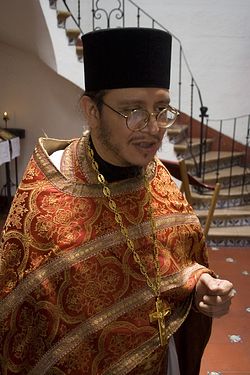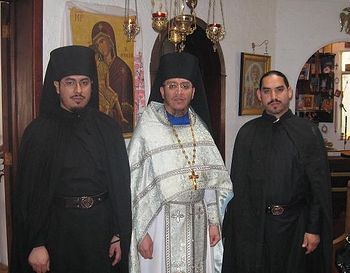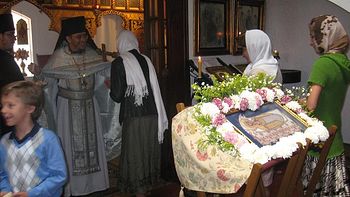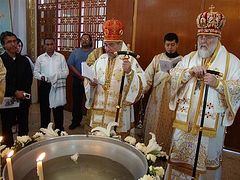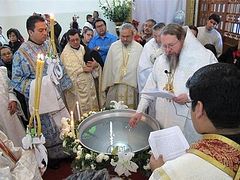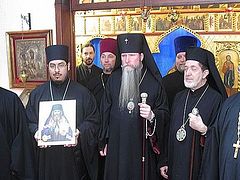Interview with Schema-Hegumen Nektariy, abbot of Holy Trinity Skete in Mexico City
Abbot Nektariy Haji-Petropoulos is an historic figure in the modern Russian Orthodox Church, say the parishioners of Holy Trinity Skete in Mexico City. In a short period of time, Fr. Nektariy and two other monks, in whose veins flows not one drop of Russian blood, have opened a Russian monastery in the heart of the Mexican capital, around which has formed a sizable Russian community.
Abbot Nektariy is well-known not only within the Russian community, but throughout Mexico. As a renowned academic, he often makes appearances on radio and television, and teaches courses in a local university. In Church circles, meanwhile, he has earned love by his meek attitude toward his parishioners, about whom he cares zealously. The abbot has cared for many people in moments of crisis, be it spiritually, financially, or legally. Dozens of women are indebted to him for saving them from domestic violence. Despite his ill health (Fr. Nektariy suffers from diverticulitis, kidney stones, and other ailments), he labors ceaselessly for the good of the monastery and the community, considering his care for them to be his sacred duty.
In the three years since the monastery’s founding, the community with Fr. Nektariy at its head has experienced many difficulties: persistent financial troubles, swine flu in Mexico, and the ill health of the abbot himself.
In the interview below, Fr. Nektary discusses how he, a Greek, became a Russian “batushka”, what it is like to be an Orthodox monk in one of the largest cities in the world, and what his parishioners mean to him.
Did you always want to be a monk?
I always knew. It wasn’t a sudden decision. I wanted to live in a monastery, to be in church. But I was an only child, so my mother said: “You cannot be a monk, I want you to have many children.” My whole family told me that I could be a married priest, but I didn’t want that. If I was to be in the Church, I would have to dedicate my whole life to the Lord.
Was your family very religious?
My parents were not very religious. I lived in Istanbul as a child, and we used to visit Greece three
times a year. We saw a lot of monasteries, and I always enjoyed their communal life: working, praying, eating together. I wanted to have that in my future.
How did you become a monk?
My spiritual father, Bishop Paul of Nazianzus, was the Greek Bishop of Mexico. He knew my father before I was born. My mother died of leukemia when I was 14. She asked Bishop Paul to take care of me, my father agreed, and I moved to Mexico and lived with him.
Bishop Paul was a well-known academic in Mexico. We had a balanced academic and religious life. He convinced me to keep studying. I wanted to go the Greek Holy Cross Seminary in Boston, but he told me to go to college first. [He said], “I don’t want you to be a simple priest; I want you to get a Doctorate in Theology.”
When he asked me if I wanted to be a monk, I said yes. I was tonsured in Mexico at 18.
My spiritual father was murdered when coming out of Church in 1984. A fanatical Catholic who hated the Orthodox Church – shot and killed him. He was arrested and later committed suicide.
You were only 19 at the time of Bishop Paul’s death. What did you do when your guardian died?
I lived in Japan with my grandmother, and went to university where I studied Archeology. Trying to follow the will of my spiritual father, I continued to study. I have a Bachelor’s Degree in Archeology, a Master’s Degree in Humanities, and a Doctorate in Theology and History. [After graduating with a B.A.,] I went back to Mexico. I felt that I needed to continue the work of my spiritual father in the Greek Church.
How did you become Abbot of Holy Trinity Skete?
It was not my choice (chuckles). In 2004, Archbishop Kyrill [of San Francisco] accepted me into the Russian Orthodox Church Outside of Russia. I was trained in a Russian monastery in Jordanville. I am a Russian priest, ordained a deacon and a priest in a Russian monastery.
When I was a teenager, I thought it was really beautiful to wait on the Lord at Liturgy, but with time I understood that being a priest is very serious, and I was not worthy of it. I knew that if it happened, it would not be my will, but the will of God. I had always hoped to be a simple monk, but God had a different plan for me: I wanted to move to the Greek monastery in Arizona, but I went back to Mexico. It was not my original plan. But since I knew the situation in Mexico, it was easier for me [rather than for an outsider] to open a monastery here.
How does it feel for you as a non-Russian to be in a tight-knit Russian community?
My family is not from Greece though, but from the Black Sea - from Sukhumi, in Abkhazia. I feel very close to Russians and they accept me very well. Their traditions are not different from those of my family. I don’t speak Russian, but I understand some of it. I am learning and the fathers are learning it, too.
What is it like to be an Orthodox monk in Mexico City?
We attract attention everywhere, because we wear our cassocks, and we have long hair and beards. We wear our cassocks daily. It shows that our way of life is different, even though we are not isolated like Jordanville, where you don’t have to go out of the monastery to work, which is a blessing. For me, being a monk means keeping my mind in heaven, even though I am on earth.
How do people in the streets treat you?
Some are aggressive because we wear a cross: they relate us to the Catholic Church and the pedophilia scandals. But most of the neighborhood knows that we are Russian Orthodox and are respectful. They know that we always wear our cassocks, so there’s no way for us to have a secret life or to do improper things while wearing civilian clothes.
[The two brethren and I] have to make a living working outside the monastery. I teach, and the fathers work at a bakery. One of them also teaches photography at a university.
You give your whole salary to the monastery?
Of course. I don’t complain about that. My main task in life is to serve the Lord. So whatever we make is for the sake of the Lord. Our parishioners are hard workers, but they have financial problems. I don’t push anyone to help the monastery; I just tell them what our needs are and they respond. If they have money they will put it into the church collection box. They are not used to going to church and contributing. Many of our parishioners never went to church in Russia, but now they come every Sunday.
Why do you think they start going to church in Mexico?
When you live in a foreign country, and you have to speak a different language, you need to look for your own roots, for your own culture, for your own people, and preserve it to know that you belong to something. Ninety eight percent of our parishioners are Russian women – newcomers from Russia. Most are married to Mexicans, and have children who are either not baptized, or baptized Catholic. It is a difficult process to help the families become Orthodox. Usually, instead of just taking care of the Orthodox person, I take care of their spouse, too. This way I will keep the whole family, and the children will be raised in the Orthodox Church. I know that if we don’t accept converts, we will lose the whole family.
How responsive are the Mexican spouses when you try to integrate them into the community? Is it difficult?
It
is very difficult in the beginning. Usually the Mexican husbands are not believers. From the beginning, I try to show them that I am not going to convert them. When they feel that I am not a threat, they bring the family and become my friends. Usually these are cultured professional people, and because I’m an academic, it’s easy for me to talk about art, history, science, etc. Everyone else speaks Russian, they talk to me in Spanish, and I don’t mention the Church to them. Six to eight months later, they ask: “Father, is it possible for me to become Orthodox? I want to be a part of this community.” It is very exciting because they are becoming one big family.Not all Russian-Mexican families have happy endings. A lot of them meet on the internet and end up having a miserable life. Some of the women are beaten by their husbands. They come to me not knowing what to do. The way the husbands control them is they keep their passports. We have some attorneys, also parishioners, who are willing to support our people. Sometimes we pay attorney’s fees, because they have no money.
Have you had any problems with the husbands whose wives you have helped?
I have been threatened many times. This happens everywhere. I know of other priests who have been threatened because they were protecting abused women. I am not afraid. I know that somebody has to defend them; to give them faith. They had no one here in Mexico. They were orphans – but not anymore. They have the Church, and we will protect them as much as we can. I will protect my parishioners no matter what.
What gives you courage?
My faith in God. It is [all] a big miracle for me… Sometimes I have been so ill that I thought I couldn’t celebrate the Liturgy, but then I put my trust in the hands of God and I told Him: “I have no physical strength, I don’t think I’ll be able to make it, please grab and hold me, so I can finish Liturgy.” Usually, by the time I finish service, I’ve forgotten about my pain and suffering. I’m sure that if I take care of my community, God will take care of me. I can see it every day. We are doing the right thing.
You are not worried about the skete’s financial situation?
If I were really worried, it wouldn’t help anyway (chuckles). If I worry about it, it means I have little faith. We had big problems in the past. People couldn’t believe that a non-Russian could open a Russian monastery. They didn’t trust us. But we were able to survive, to open a chapel. It is very beautiful now. So to worry about finances would be not to trust in God. I trust in Him, I trust that He will provide. We even reach out to other cities in Mexico.
What are your greatest needs?
We have a Jeep we use for the work in the factory – the fathers take it in the morning. I go to the college by taxi, but it’s quite far and expensive. Going across the city takes about three hours with traffic, and it is dangerous for me to climb up the bus or to take the subway, because I have a problem with my knees.
We definitely need a second car, but it costs about $5,000. Monastery rent is around $2,000. We need to put in another toilet – we have only one now and it’s not enough for the number of pilgrims we receive.
One thing that has been making things more difficult is my health. Treatments, tests, and visits to the hospital cost us a lot of money – about $700 a month. I’ve had no income for two months because I haven’t been teaching and I still had to go to the doctor, because I’ve been having problems with kidney stones. I’m not doing very well these days.
But God has been very, very merciful to me, [even though] I haven’t been able to do as much as I should. Our daily struggle is nothing in comparison with the joy of being a priest in the family, of being able to open our monastery to those who have been orphans for so many years.
Father, you mentioned that you haven’t done everything you should. What exactly did you mean?
At times I was so tired of the pain, of struggling with the finances. I spent a lot of time just struggling instead of working and pushing myself to do more for the families. I just couldn’t do it. I regret it, because I know that every person who comes to church has a need and that I should forget about my own struggles and sufferings. This is my duty.
Don’t think that we are suffering every day. On the contrary, [it is a joy] to see our children, who are growing up with an irreligious Mexican father, [being] integrated into the community. They speak Russian, they are Orthodox. Our Russian women have the consolation of coming to Church and being part of a community. These are real blessings.
The interview was conducted by Alena Plavsic
To donate to Holy Trinity Skete, please click here or send checks made out to the Fund for Assistance, memo "Mexico Skete" to:
Fund for Assistance to ROCOR
75 E 93 St
New York, NY 10128

